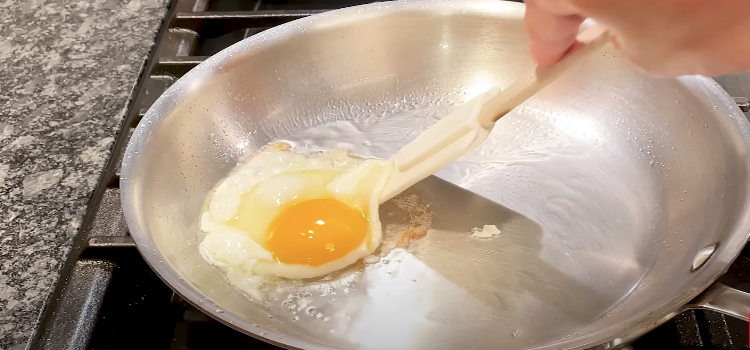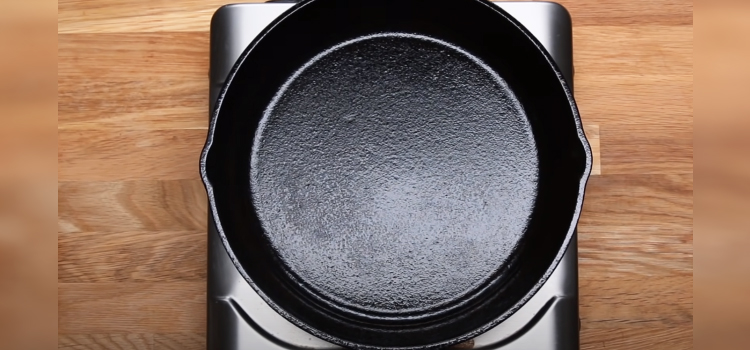Last Updated on September 12, 2024 by Shari Mason
Encountering the issue of eggs sticking to your pan can disrupt your cooking process, whether it be during breakfast, lunch, or dinner. Even using butter or cooking oil may not always prevent this kitchen mishap, leaving you with a bothersome mess of eggs to clean up.
This can be especially true when it comes to non-stick cookware. So why do eggs stick to the pan, and what can you do to prevent it?
We’ll explore the various reasons why eggs stick to the pan and a few tips and tricks to help you prevent it from happening.
Why Are Eggs Sticking To The Pan?


When eggs [1] are cooked in a pan, they can often stick to the bottom and sides of the pan. This is due to a combination of factors, including the amount of heat applied, the type of pan and how it is seasoned, and the type of eggs being cooked.
For instance, when eggs are cooked in a pan that is not pre-seasoned, they will often stick more easily than if the pan were seasoned beforehand.
Additionally, if too much heat is applied or the pan is overcrowded, the eggs will cook at a variable rate, which can cause them to stick.
Finally, certain types of eggs, such as those that are overcooked or those that have a high-fat content, are more likely to stick to the pan than others.
To avoid this issue, it’s important to use the proper cooking temperature, keep the pan properly pre-seasoned, and use the right type of eggs for cooked food.
Read:
- Can You Freeze Egg Whites In A Carton?
- Why Does My Rice Stick To The Pan?
- How To Flip An Omelette Without Breaking It?
How To Prevent Them From Sticking To The Pan
To prevent eggs from sticking to the pan, it is important to use a non-stick pan and ensure it is properly heated before adding oil or butter.
It is also important to keep the heat at medium-low and to use a spatula to scramble or stir the eggs as they cook.
Lastly, avoid overcrowding the pan, as this can lead to sticking.
Read: Can Non-Stick Pans Go In The Oven?
What Does It Mean When Eggs Stick To Pan?
When eggs stick to a pan during cooking, it is usually a sign that the pan is too hot or the eggs have been cooked for too long.
This is because the egg proteins bind together as they cook, forming a bond between the pan and the eggs.
“The egg can be your best friend if you just give it the right break.”
– Julia Child, Chef
To prevent this from happening, you should use a non-stick pan, reduce the heat, and keep a close eye on the eggs while they cook.
Read: How To Know When Scrambled Eggs Are Done?
Why Do They Stick To The Pan Even With Oil?
Eggs stick to the pan even with oil because when the egg is heated, the proteins in the egg whites begin to form bonds with the pan’s surface.
This is a process called denaturation [2], which increases the egg’s stickiness. Oil can help reduce the amount of sticking, but the egg will still stick if the pan is not sufficiently hot.
Oil can easily burn and become sticky, further contributing to the sticking problem.
Read: How Long Do Scrambled Eggs Last In The Fridge?
Best Pans To Cook Eggs Without Sticking


- Nonstick Skillets – Nonstick skillets are the easiest and most common pans to cook eggs without sticking. Non-stick skillets are coated with a special coating that prevents food from sticking to the surface.
- Cast Iron Skillets – Cast iron skillets are another popular option for cooking eggs without sticking. Cast iron is naturally non-stick and holds heat well, so it’s perfect for making perfect eggs.
- Stainless Steel Pans – Stainless steel pans may require extra maintenance, but they’re great for making eggs without sticking. Heat the pan, add oil or butter, and let the egg cook on low heat until it’s done.
- Ceramic Pans – Ceramic pans are great for cooking eggs without sticking. The non-stick surface ensures that the eggs slide right out of the pan once cooked.
Read: How Long Can Store-Bought Eggs Sit Out?
Tips On How To Prevent Eggs From Sticking To The Pan
- Use a non-stick pan: Invest in a non-stick pan for the best results. The non-stick coating helps to prevent the egg from sticking to the pan.
- Use oil: Before adding the eggs to the pan, grease it with a thin layer of oil. This will help create a barrier between the egg and the pan and prevent sticking.
- Use a low heat: Cooking with a lower heat will prevent the egg from sticking to the pan.
- Use a spatula: When the egg is almost done, gently lift the egg away from the pan. This will help to prevent it from sticking.
- Let the egg cook properly: Ensure it is cooked properly before attempting to remove it from the pan. If the egg is not cooked thoroughly, it will stick to the pan.
Read: Can You Whip Egg White In A Blender?
FAQs
u003cstrongu003eCan you prevent scrambled eggs from sticking to the pan?u003c/strongu003e
Yes, you can prevent scrambled eggs from sticking to the pan by using a non-stick pan, using some oil or butter to grease the pan, and stirring the eggs frequently while cooking.
u003cstrongu003eShould you spray the pan before cooking eggs?u003c/strongu003e
Yes, it is always a good idea to spray the pan with cooking spray or oil before cooking eggs. This will help prevent the eggs from sticking to the pan.
u003cstrongu003eWhat do you spray a pan with before eggs?u003c/strongu003e
Most recipes will call for a light coating of cooking oil or butter to prevent the eggs from sticking to the pan.
Final Thoughts
Although many variables will affect how your eggs stick to the pan, ensuring that the pan is adequately greased before cooking is the most important factor.
Additionally, ensure that the pan is preheated to the right temperature before adding the eggs and that the heat is regulated to avoid burning the eggs.
With these tips and a little practice, you’ll soon be cooking eggs that don’t stick to the pan.
References:
- https://www.hsph.harvard.edu/nutritionsource/food-features/eggs/
- https://www.britannica.com/science/denaturation
- Can You Put an AC Unit in the Kitchen? - September 27, 2024
- What Cheese Does Olive Garden Use? Discover Their Signature - September 27, 2024
- How to Cancel a Pizza Hut Order? Quick & Easy Guide - September 24, 2024


